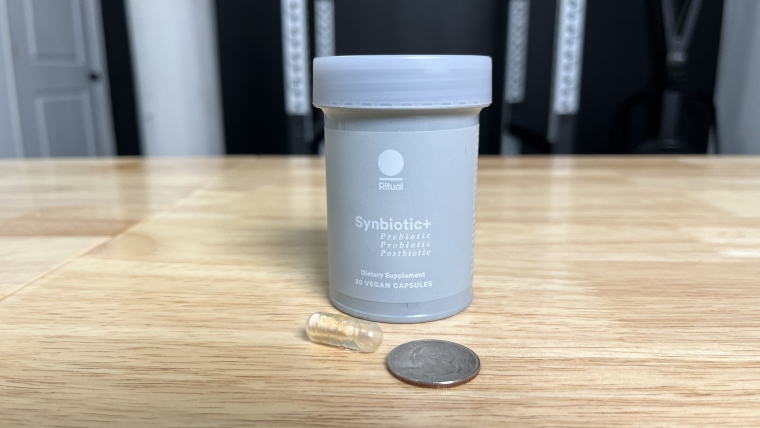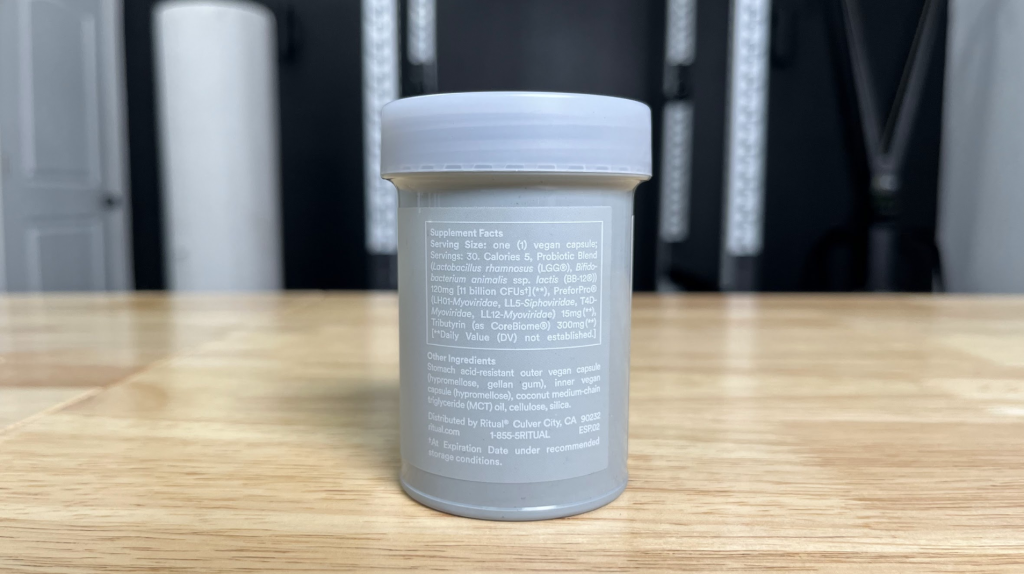Your gut microbiome consists of trillions of living (yes, living) bacteria called probiotics. These microorganisms are vital to your immune and digestive systems, and can even influence your mood and energy levels. (1) Now, eating a well-rounded diet containing probiotic-rich foods like yogurt and kimchi is always a good way to keep your bacteria count in check, but probiotic supplements can also be a worthwhile method for giving your gut a daily boost.
The best probiotics for men can be a simple addition to your supplement stack, but finding the formulation that’s ideal for you can be tough. After all, these supplements are more complex than your typical protein powder or multivitamin, and certain bacteria strains can lead to different sensations in your gut and body. So, to help you narrow down your search, we tested over 20 top-performing probiotic supplements, conducted hours of research, and reviewed hundreds of customer reviews to find the seven best probiotics for men available now.
The 6 Best Probiotics for Men of 2025
- Best Probiotic for Men Overall: Transparent Labs Gut Health Probiotic
- Best Probiotic for Men’s Gut Health: Onnit Gut Health with Probiotics
- Best Comprehensive Probiotic for Men: Ritual Synbiotic+
- Best Probiotic for Weight Loss: Sports Research Probiotic
- Best Probiotic and Prebiotic: Seed Daily Synbiotic
- Best Probiotic for Men’s Digestion: Athletic Greens AG1
Editor’s note: The content on BarBend is meant to be informative in nature, but it should not be taken as medical advice. The opinions and articles on this site are not intended for use as diagnosis, prevention, and/or treatment of health problems. It’s always a good idea to talk to your doctor before beginning a new fitness, nutritional, and/or supplement routine.
How We Tested
The BarBend team is made up of competitive athletes, certified personal trainers, and lifelong fitness enthusiasts. We know that health and wellness is not just about how you look on the outside, but how you feel on the inside, as well. For this round-up, we tested 22 probiotic supplements, noting how their complex formulations influenced our daily wellness levels. Based on our supplement testing methodology, we examined each tested product’s ingredients list, focusing on the number of colony-forming units in each serving, as well as the included strains per dose.
We also kept an eye out for other ingredients that could potentially bring added fiber, vitamins, or minerals to our supplement stack. Probiotics that featured some form of third-party testing were also noteworthy, giving an added sense of reassurance that the supplements were free of any banned substances.
Given the fact that probiotics are living microorganisms, we also took note of any special storage requirements that came with these supplements. Did they need to be refrigerated or kept in certain conditions, or could they share countertop space with some of our other daily supplements?
Lastly, probiotics can be some of the most expensive supplements in your regimen, with some complex formulations costing upwards of $3 per serving. We looked at a variety of price points in testing to create a well-rounded list catering to all budget types.
Best Probiotic for Men Overall: Transparent Labs Gut Health Probiotic
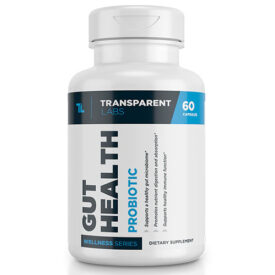
Transparent Labs Gut Health probiotic contains 1,000mg of probiotics (100 billion CFU) — one of the highest doses on the market. This supplement is also vegan since the capsules are made from plant-based hypromellose.
Specs
- Price Per Serving: $1.53
- Form: Capsules
- Included Strains: 10
- Colony Forming Units: 100 billion per serving
- Storage Instructions: Store in a cool, dry place
Pros
- Men wanting a robust probiotic will appreciate the 100 billion CFUs per serving.
- This probiotic comes in a capsule, making it easy and convenient to consume.
- This probiotic is free of artificial sweeteners, preservatives, and colorings.
Cons
- Not all athletes will need a probiotic with 10 varying strains.
- The 100 billion CFUs per serving can potentially cause stomach discomfort for some. (6)
- Athletes can find cheaper probiotics out there, albeit with lesser CFUs per dose.
Thanks to a hearty dose of colony-forming units, a convenient capsule makeup, and a simple storage method, we believe Gut Health Probiotic from Transparent Labs to be the best probiotic for men available today. In testing, it was clear that this particular probiotic was the most robust formulation we tried, packing in 10 individual strains of microorganisms for a total of 100 billion CFUs per serving. That’s well beyond the typical dosage, which commonly ranges between one and 10 billion CFUs per serving. (4)
We also appreciate how Transparent Labs utilizes lactobacillus acidophilus (LA-14) as its predominant probiotic in the formulation at a listed 25 billion CFU per dose. This is one of the most commonly used probiotics in formulations for its tendency to create unfriendly environments for “bad” bacteria in the intestines. (5) Common effects of supplementing with this “good” bacteria may include improvements to your immune and digestive systems, a better tolerance to lactose, and lessened symptoms associated with chronic constipation and irritable bowel syndrome.
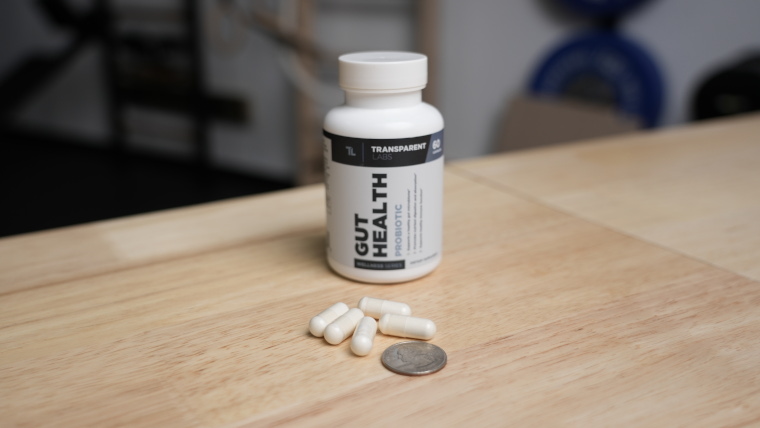
Additionally, we enjoyed how easy it was to add this Transparent Labs probiotic to our regimen. A serving consists of two capsules, so finding the time in the morning for proper consumption is a breeze. Also, we liked that this probiotic supplement doesn’t need to be refrigerated after opening, which allowed us to keep the bottle handily on our counters for quick, convenient servings each day. Other probiotics require a cold environment to retain their potency over time, which can add another (albeit small) step to the process.
As impressive as this probiotic is, however, we recommend you ease into a regular supplement schedule with this pick. The 100 billion CFUs per dose can give you a major gut check at first, especially if you’ve never taken a probiotic supplement before. Symptoms can include stomach discomfort, bloating, gas, or diarrhea — not exactly the results you’re likely looking for from the start. (6)
It may be best to cut your servings in half at first to get a feel for your body’s reaction to the extra microorganisms. If that still leaves you with uncomfortable sensations, you may need to opt for a probiotic with less CFUs.
[Related: Why Probiotics Are Extra Beneficial for Athletes]
Best Probiotic for Men’s Gut Health: Onnit Gut Health with Probiotics
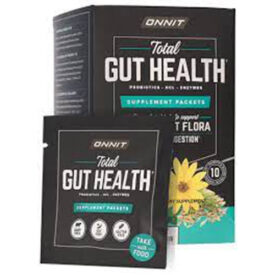
Onnit Gut Health with Probiotics includes a digestive enzyme supplement, five strains of probiotics, two types of prebiotics, and a dose of betaine HCI. If you subscribe, you can save $10 per month on this supplement.
Specs
- Price Per Serving: $2.53
- Form: Capsules
- Included Strains: 5
- Colony Forming Units: 10 billion per serving
- Storage Instructions: Store in a cool, dry place.
Pros
- Each packet contains 900mg of Jerusalem artichoke and 600mg of organic dandelion root to fuel the probiotics for a more positive balance in gut flora overall.
- The DigestTech enzyme blend can help you better digest key macronutrients, according to the brand.
- The single-serving packaging can be great for keeping supplementation simple.
Cons
- At nearly $75 for a month’s supply, this probiotic may not fit in every athlete’s budget.
- Pill-averse athletes may prefer a probiotic with less than seven capsules per serving.
- The individual packets can create added waste and refuse.
If your main goal of adding a probiotic to your stack is to improve your gut health and digestion, we recommend Onnit’s Gut Health with Probiotics packets. You get seven capsules in a convenient single-serving packet, and while this may be too many pills at once for some, we think the performance supports the added capsules.
This makeup allows each component, like Onnit’s flagship full-spectrum DigestTech enzyme blend, to be properly dosed with key ingredients like Amylase, Protease, Lipase, Pectinase, Lactase, and others for the sake of improved digestion and gut health. There are also two capsules containing 900mg of Jerusalem artichoke and 600mg of organic dandelion root, which serve as prebiotics for the five included probiotic strains. Prebiotics, essentially, serve as food for other probiotics, allowing the microbiome to stay naturally balanced over time. (7)
There’s also something to be said about the single-serving packaging. We enjoyed how simple it was to have this gut booster on-hand, especially during travel days or stays away from our kitchen and supplement cabinet. Additionally, Gut Health with Probiotics doesn’t require additional storage precautions like refrigeration, meaning you can easily store your daily packet in a pocket or gym bag until it’s time for your daily dose.
At nearly $75 for a month’s worth of gut support, though, we understand that Onnit’s Gut Health with Probiotics may be too expensive for some budgets. You’re able to find other probiotic supplements that can deliver digestive support for much less, albeit in a less convenient packaging. Be sure to analyze your budget and personal needs before ordering a stack of your own.
Best Comprehensive Probiotic for Men: Ritual Synbiotic+
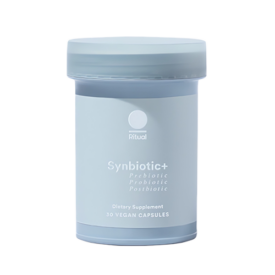
Ritual Synbiotic+ offers pre-, pro-, and postbiotics in a fiber capsule that keeps the probiotic tablet intact until it reaches the colon, where the probiotics can do the most good.
Specs
- Price Per Serving: $1.80
- Form: Capsules
- Included Strains: 2
- Colony Forming Units: 11 billion per serving
- Storage Instructions: No refrigeration needed.
Pros
- The formulation is robust with 15mg of prebiotics, 11 billion CFUs of probiotics, and 300mg of the postbiotic Tributyrin.
- This probiotic doesn’t need to be refrigerated to maintain its potency.
- The delayed-release capsule can help the included probiotics reach the colon more easily.
Cons
- Ritual automatically signs you up for repeat orders at the time of initial purchase.
- Some of our testers noted uncomfortable sensations like gas and bloating with the first few doses.
- Each capsule features a minty flavoring, which may be undesired by some.
For balancing your gut microbiome efficiently, it’s tough to beat Ritual’s Synbiotic+. Each daily serving is just one capsule, and that easy-to-swallow dose delivers a comprehensive three-in-one formulation containing prebiotics (bacteria food), probiotics (“good” bacteria), and postbiotics (even more bacteria food).
We appreciate this makeup, as it helps give the included probiotics the best chance possible to flourish. The 15mg of prebiotics serve as both a delayed-release capsule to have the probiotics delivered effectively to the colon, as well as food for the bacteria once they’ve reached their destination. The included 300mg of Tributyrin can also be beneficial for bloating and indigestion, according to studies. (8)
The main ingredients, naturally, are the two probiotic strains — lactobacillus rhamnosus and bifidobacterium animalis ssp. lactis. These two bacteria have been shown to effectively improve your gut barrier, allowing for the optimal growth of “good” bacteria within your microbiome. (9)(10) We also appreciate the dosage of this probiotic blend, as 11 billion CFUs is just slightly above the average probiotic serving yet still can be effective for a number of athletes. (4)
We do want to note, though, that while we witnessed the effectiveness of Synbiotic+ during testing, it wasn’t an immediate boost to our systems. Our tester noted that after taking Synbiotic+ for the first few days of trials, they experienced some uncomfortable gas and digestive rumblings — common symptoms associated with probiotic supplementation. (6) Thankfully, though, these side effects subsided after the initial flare-ups, and they noted no discomfort for the rest of their scheduled doses.
Best Probiotic for Weight Loss: Sports Research Probiotic
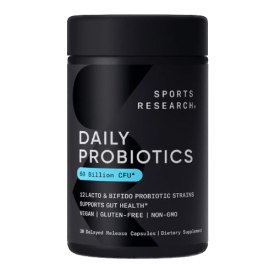
Sports Research Probiotics is formulated with 60 billion CFU's (colony forming units) to support gut health by replenishing good bacteria. Each delayed-release veggie capsule contains 12 Lacto and Bifidobacteria strains of shelf-stable probiotics, along with 60mg of Fiber Inulin.
Specs
- Price Per Serving: $0.93
- Form: Capsules
- Included Strains: 12
- Colony Forming Units: 60 billion per serving
- Storage Instructions: Refrigeration recommended
Pros
- This probiotic’s fiber inulin blend can support weight loss by altering your gut’s microbiota. (29)
- There are 60 billion CFU’s and 12 strains of good bacteria in each serving.
- Each serving only requires taking one pill.
Cons
- The strains of bacteria are a blend, so we can’t verify just how much of each is in the formula.
- The label recommends refrigeration.
On top of its 60 billion CFU’s, Sports Research Probiotic contains a 60-milligram fiber inulin blend that may help promote weight loss. (29) These two elements of the formula helped it earn a 4.5 out of 5 from Chelsea Rae Bourgeois, MS, RDN, LD, “Each serving of Sports Research Probiotics provides 60 billion CFUs of a daily probiotic blend, more than what research has established as the recommended minimum,” she said. “It also contains a fiber inulin blend, which may support a healthy metabolism, blood sugar control, and the fight against inflammation.”
[Related: Probiotics for Weight Loss]
Inulin has been associated with increased levels of the digestion-supporting probiotic Bifidobacterium, which has been shown to reduce body fat. (30)(31) Bifidobacterium is just one of the 12 strains of good bacteria found in Sports Research Probiotic that can support a healthy digestive system.
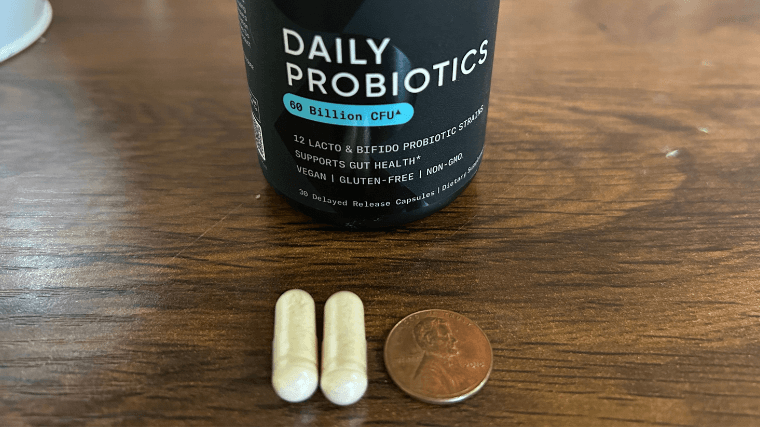
After taking these for a few weeks, BarBend editorial member and certified personal trainer Kate Meier rated the pill’s swallowability 5 out of 5. “These penny-sized pills are pretty slim and so easy to swallow,” she said. “Some supplements require multiple pills per serving, so I love only having to take one because I’m totally not a pill person!”
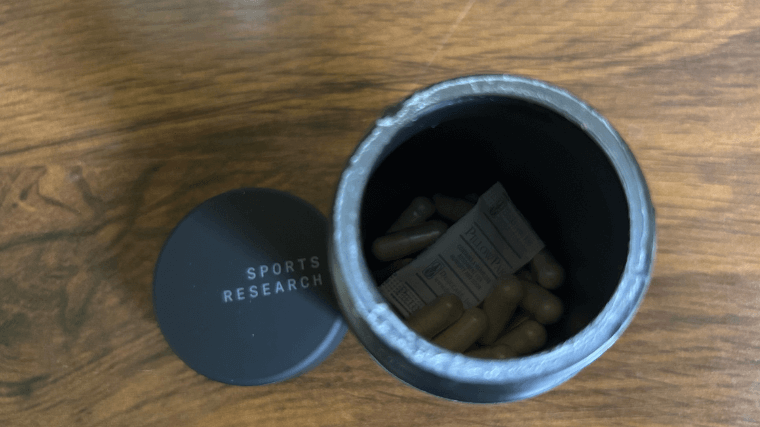
While we are fans of this probiotic’s formula, as Bourgeois points out, we can’t verify exactly how much you’ll be consuming in each one-pill serving. “While it’s not uncommon in a probiotic supplement, the bacteria strains are in a proprietary blend, so you can’t be sure how much of each is in the product,” she says.
Sports Research Probiotic is shelf-stable, so you could store it at room temperature. But, the label includes a recommendation that you store your bottle in the fridge, so you may be better off keeping it cool.
Best Probiotic and Prebiotic: Seed Daily Synbiotic
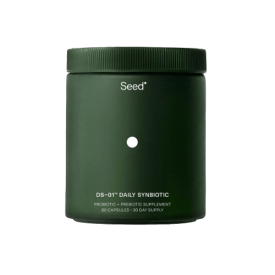
Seed Daily Synbiotic's probiotic and prebiotic formula can help provide benefits for gut immune function and whole-body health. This research-backed daily supplement can also support digestive health and ease bloating. Use code BARBEND20 for 20% off your first purchase.
Specs
- Price Per Serving: $1.66
- Form: Capsules
- Included Strains: 24
- Colony Forming Units: 53.6 billion AFU (active fluorescent units) per serving
- Storage Instructions: No refrigeration needed
Pros
- It features an inner probiotic capsule and outer prebiotic capsule.
- This dual capsule can help the prebiotics reach your large intestine and colon instead of being broken down in your stomach.
- Even after opening the seal, it doesn’t need to be refrigerated.
Cons
- You must choose one of three subscription options at checkout.
- Seed’s formula has not been third-party tested.
Anytime you take probiotics, you’re adding new microbes to your gut. Prebiotics, on the other hand, can feed the intestinal microbiota and release short-chain fatty acids and affect organs far beyond the gastrointestinal tracts. (7) Huh? In short, they can help healthy bacteria grow. Along with its 24 strains of probiotics, the prebiotic blend is sourced from pomegranates — one of the best prebiotic foods. Seed Daily Synbiotic’s formula earned a 4.5 out of 5 from Chelsea Rae Bourgeois, MS, RDN, LD.
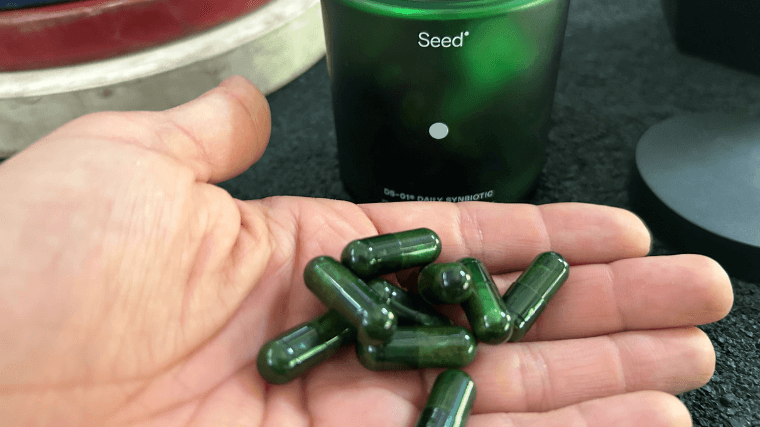
“Seed’s Daily Synbiotic contains an impressive blend of probiotic and prebiotic bacteria to support gut and overall health,” Bourgeois says. “I like that Seed breaks down their bacteria blends into categories of health benefits. Each serving of Synbiotic contains 53.6 billion AFU of various bacteria, each offering research-backed benefits. And because they have been freeze-dried, you don’t have to refrigerate the product.”
Seed’s ViaCap Delivery Technology utilizes an outer prebiotic capsule that shields the inner probiotic capsule from stomach acid. This helps ensure viability through digestion to help the probiotics reach your colon.
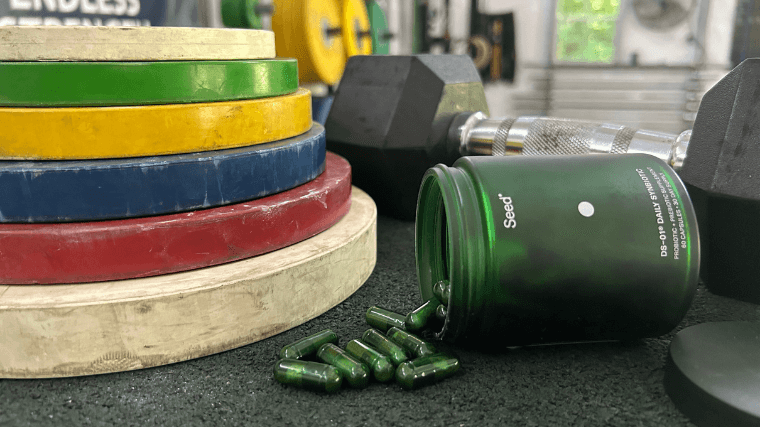
As a person with a sensitive stomach, our tester noted how a quality probiotic can impact their day. “I used Seed before bed to help settle my stomach and it worked really well,” they said. They also noted that the size of the capsule was a bit large and rated its swallowability 4 out of 5. “The pill itself is about the diameter of a quarter. It wasn’t overly difficult to swallow with just water, but it was easier to have a snack to help push it down.”
While all those strains and AFU’s sound impressive, Bourgeois points out that its formula hasn’t been verified. “Seed doesn’t mention third-party testing on their website,” she said. “I wish this product was tested by an independent lab for purity.”
Best Probiotic for Men’s Digestion: Athletic Greens AG1
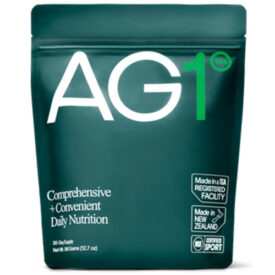
Specs
- Price Per Serving: $2.63
- Form: Powder
- Included Strains: 2
- Colony Forming Units: 7.2 billion per serving
- Storage Instructions: Refrigerate after opening.
Pros
- The digestive enzyme complex is rich with stomach-boosting ingredients, including astragalus root extract, bromelain, and burdock root powder.
- The layered formulation features 75 different components targeting multiple health categories, like digestion, focus, energy, and healthy aging.
- Our tester enjoyed the vanilla and pineapple flavoring that cut through the “grassy” taste.
Cons
- The powder can begin to settle if not consumed immediately after mixing.
- Not all athletes will need as robust a formulation as this greens powder.
- To maintain its potency and effectiveness, AG1 needs to be refrigerated.
Athletic Greens AG1 is more of an all-in-one super beverage than a standalone probiotic for men, but that doesn’t mean it can’t enhance your digestive system with worthwhile ingredients. Of the 75 (yes, 75) ingredients listed in a single serving, key standouts include the 154mg of Athletic Greens’ Digestive Enzyme and Super Mushroom Complex. This blend includes astragalus root extract, bromelain, and burdock root powder as well as reishi and shiitake mushroom powder to help you absorb vital nutrients and support your gut lining, according to the brand.
There’s also a hearty serving of probiotics in this concoction, too — 7.2 billion CFUs, to be exact. Combining lactobacillus acidophilus and bifidobacterium bifidum, this serving can be excellent for breaking down nutrients for absorption and fending off “bad” bacteria looking to infiltrate your microbiome. (5)(15)
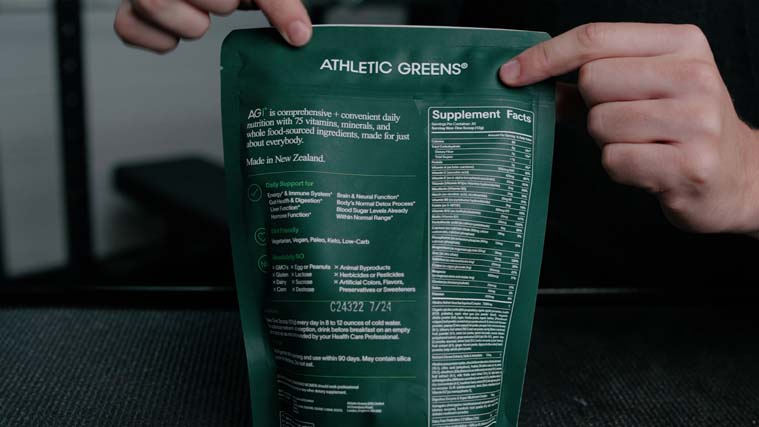
In testing, we enjoyed this comprehensive greens powder, and felt it was a convenient way to up our intake of vital nutrients, vitamins, probiotics, and more in one fell swoop. Additionally, our tester said the vanilla and pineapple flavoring did wonders to eliminate that “grassy” taste often associated with greens powders. We do recommend wasting little time with this shake once it’s been made, though. We noticed that the powder can begin to separate if left alone for too long between sips.
Naturally, though, AG1 may not be the best probiotic for athletes just looking for an extra helping of bacteria each day. There are a litany of extra ingredients designed to promote overall health and wellness, and while these can be great additions to your nutrition plan, it may be overkill for some. If you’re looking for that convenient one-stop-shop to start your day, AG1 can deliver, but if you just want a simple way to target your microbiome, there are cheaper options on the market.
Read our full Athletic Greens AG1 Review.
How We Choose the Best Probiotics for Men
Probiotics are some of the most popular supplements out there today, according to the American Pharmacists Association, and sifting through the available options can be a tricky endeavor. (17) Different strains and dosages can impact everyone at varying levels, so we looked at a number of factors, including colony forming units, storage requirements, featured probiotic strains, and price per serving when building out this well-rounded guide.
Colony Forming Units
Probiotics are measured in colony forming units (CFU), which indicate the number of viable cells in a given serving. (4) Dosages can range from brand to brand, with many falling somewhere between one and 10 billion CFUs per serving. Most individuals can be fine with these formulations, but others may require slight adjustments.
If you’re new to probiotics, you may want to ease into the supplement with a CFU count between one and five billion. This can help eliminate the potential for initial growing pains like an upset stomach, bloating, or increased gassiness. (6)
More experienced athletes can explore higher CFU totals, even up to 100 billion per serving. As such, we aimed to cover the gambit of CFU servings, with the included probiotic supplements ranging between 5.75 and 100 billion units per dose.
Storage Requirements
To maintain potency and effectiveness from the first serving to the last, some probiotics may require some extra attention when it comes to storing the supplement in-between doses. Typically, this means tossing the container into the fridge — a minor adjustment, indeed — but when you compare that to other supplements that can stay within view on a countertop day in and day out, it does add another step to the process.
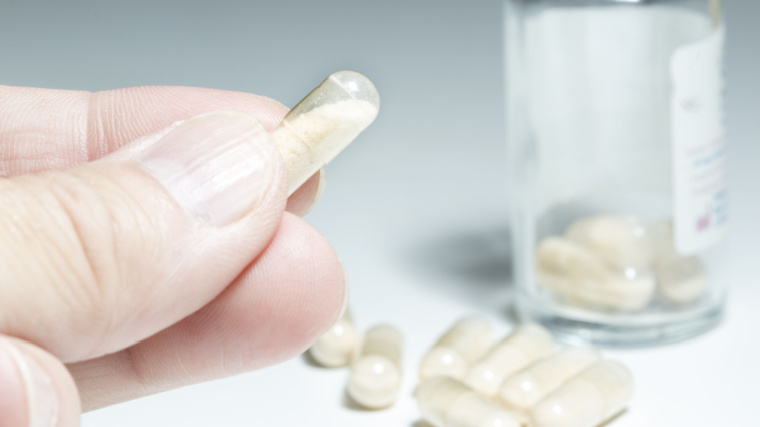
To suit all convenience preferences, we looked at a variety of supplements with different storage requirements. If you need to clear some space in your fridge for the sake of housing your gut-boosting capsules and powders, we made note of it above.
Available Strains
There are multitudes of bacteria that live in your gut, and many of the premium probiotics employ a myriad of strains to support your digestive and immune systems. We made note of common bacteria showcased in our top picks, explaining how they could potentially influence your microbiome and where you could see the potential benefits. If a certain bacteria was worthwhile at fending off “bad” bacteria, we also pointed that out in our research findings above.
We also looked for probiotic supplements offering a variety of strains in a given serving. These particular options were appealing to us, as they posed as a greater influence on our digestive health over the span of trials. When supplements didn’t house a multitude of strains in their formulations, we made note of that as well.
Price Per Serving
How costly your probiotic supplement of choice is depends on its makeup — the more robust a formulation is, the more expensive it’s likely to be when it comes time to check out.
In our research and trials, we found the most noteworthy probiotics to fall anywhere from 33 cents per serving and 2.63 per serving. We’ve also included a good mix of supplements that fall in the middle of this range in an effort to cater to more budgets, highlighting budget-friendly components and savings opportunities wherever possible.
The Benefits of Probiotics for Men
One of the main benefits associated with probiotic supplementation is improved digestion, but these living concoctions can provide much more to your physique from top to bottom (literally). Below are a few of the top benefits associated with probiotics, along with how you can expect these supplements to improve your day to day.
Improved Digestion
Probiotics can help restore balance to your natural microbiome, leading to reduced sensations like bloating, gas, and other digestive issues. (4) The featured bacteria in most probiotic supplements can also help fend off potential “bad” bacteria trying to infiltrate your flora, leading to better gut maintenance and sustained wellness in the long run. (18)
Immune Support
In addition to keeping your microbiome in order, probiotics can also prove effective across your immune system as well. Supplementing with probiotics can be a great method of keeping “good” bacteria in your system while also defending against “bad” bacteria known to cause disease and illness. Having a strong, balanced gut flora can also influence your immune system’s responses to illness, releasing helpful T cells during the threat of infection. (19)
Prostate Health
Men can also benefit from probiotics thanks to their influence on your prostate. Studies indicate that altering your gut microbiome with probiotics may help prevent or delay prostate cancer development. (27) Additionally, taking a daily serving of probiotics can potentially help increase your testosterone levels while balancing other sex hormones. (28)
Boosted Energy Levels
Your microbiome can also influence your energy levels throughout your daily activities, as studies suggest that creating a worthwhile environment for bacteria to flourish can lead to lessened fatigue. (20) Additionally, certain bacteria strains, like lactobacillus plantarum, have been linked to improved endurance during exercise, which can be great for keeping your energy consistent during hard-nosed training sessions. (11)
Mental Clarity
Dealing with an unhealthy gut can be a stressful challenge in its own right, but did you know that there’s an actual connection between the functionings of your brain and that of your microbiome? (21) Having a balanced gut flora can help lower stress levels and improve cognition, according to studies. (22)
Common Probiotic Strains for Boosted Health and Wellness
When looking into worthwhile probiotics for your supplement stack, it doesn’t take long to realize that there are a lot of bacteria strains out there with the potential to improve your microbiome. Below are just a handful of noteworthy bacteria strains to keep an eye out for when determining the best probiotic supplement for your needs.
Lactobacillus acidophilus
As one of the most common probiotics used in supplementation, this strain can be beneficial for athletes thanks to its influence on digestive and immune systems. Additionally, lactobacillus acidophilus can be a great defense against “bad” bacteria looking to infiltrate your microbiome, acting as a powerful barrier for sustained wellness throughout your regimen. (5)
Lactobacillus fermentum
Fermentum strains of bacteria have been linked to decreases in blood stream cholesterol, along with other benefits including defending against gastrointestinal and upper respiratory infections. (23) Because of these potential perks, this bacterial offering can be an excellent option for those putting a heightened emphasis on their immune health during probiotic supplementation.
Lactobacillus casei/paracasei
This bacteria strain can be especially influential on your immune system thanks to its potential for immune modulation, improved gut barrier development, and boosted defense against pathogen adhesion. (13)
Lactobacillus plantarum
According to studies, this training-focused strain can be a premium pick for active individuals thanks to its benefits pertaining to elevated aerobic endurance capacities. (11) Also, lactobacillus plantarum can be great for maintaining body composition, digestive health, and energy retention throughout your fitness regimen.
Lactobacillus reuteri
This is another strain commonly found in the human microbiome, but given the shift in lifestyle changes over the decades, has become decreasingly present in many over time. (24) Supplementing with strains of lactobacillus reuteri can help replenish CFUs for the sake of fighting inflammation and eliminating infections present within the gut.
Lactobacillus delbrueckii subsp. Bulgaricus
Lactobacillus delbrueckii subsp. Bulgaricus was one of the first probiotics ever studied, with notes and research dating back as far as 1882. In that time, studies have shown this strain’s heavy influence on digestion and the immune system, boasting such benefits as decreased inflammation, improved IBS symptoms, better digestion of dairy, and more. (25)
Lactobacillus rhamnosus
You can think of this strain as the helpful cockroach of the bunch, as lactobacillus rhamnosus is resistant to acid and bile, meaning it isn’t destroyed easily in your stomach. As such, this strain can be a great team player when promoting a healthy gut wall, regulating your immune response to infections, and fending against unwanted bacteria. (9)
Bifidobacterium longum ssp. Longum
Studies indicate that supplementing with this particular strain could lead to improved post-workout recovery, as seen in a tested sample of female swimmers over a six-week exercise training phase. (26)
Bifidobacterium bifidum
Serving as another common strain found in probiotic supplements, bifidobacterium bifidum can help manage your digestive system and boost your immune system. There’s also evidence showing its effectiveness against irritable bowel syndrome and other discomforting intestinal conditions. (15)
Bifidobacterium animalis ssp. Lactis
This impressive bacteria strain is already found in the human gut, but supplementing with added CFUs can be an excellent way to maintain optimal counts for intestinal health. Bifidobacterium animalis ssp. Lactis has been shown to be effective in helping with constipation as well as irritation from such conditions as irritable bowel syndrome and general stomach discomfort.(10)
How to Find the Best Probiotics for Men
The right probiotic for your needs can depend on a number of factors, including your body’s tolerance to added bacteria from the start, your budget, and how convenient you’d like your supplement to be within your daily schedule. Below are a few factors to consider when choosing between the best probiotic supplements for men.
Find Your Ideal Colony Forming Units
Each probiotic supplement will showcase a unique number of CFUs per serving, which refers to how many viable cells of bacteria are present in the formulation. (4) This number can vary from brand to brand, with typical doses ranging between one and 10 billion CFUs per serving.
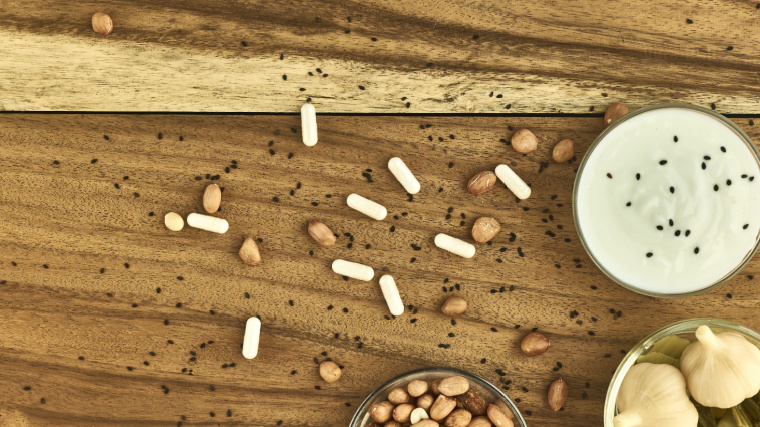
How many CFUs you need can depend on your tolerance and digestive health, so it can be best to look for probiotics offering CFUs within this one to 10 billion range at the start. As you learn and grow accustomed to your body’s reaction to the supplement, you can explore higher doses — some can even reach as high as 100 billion CFUs per dose.
Consider Available Strains
There’s no shortage of bacteria strains out there, and many “good” bacteria can prove to be effective when trying to boost your microbiome’s wellness levels. Additionally, varying strains can lead to specific benefits, from improved digestion, to immune support, better aerobic endurance, and others. (4)
When deciding between probiotic supplements, take a look at the listed bacteria strains to see if the potential benefits align with your wants and needs. Additionally, many premium probiotics combine two or more strains in a single serving, adding to the potency and potential benefits you can see within a single dose.
Think About Storage Needs
To help retain their potency after their packaging has been opened some probiotics require extra care when it comes to storage. Oftentimes, this boils down to keeping your supplements in a cool, dry place or in the refrigerator for optimal conditions. As such, it’s important to read the storage recommendations of your chosen supplement and accommodate those instructions accordingly.
Choose Your Probiotic Form
Many of the best probiotics for men come in either a powder or capsule format. Whichever you choose, though, depends entirely on your convenience preferences.
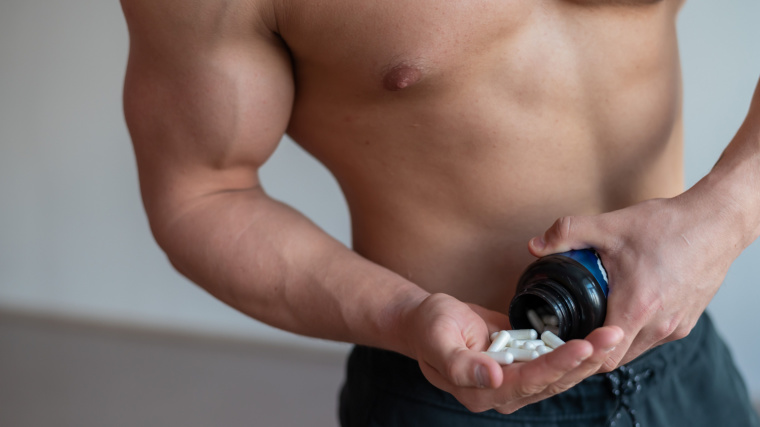
For those that don’t mind swallowing pills, or those that want a format more accommodating for travel, we recommend capsules. For those needing a little flavor in their supplementation, or who are pill-averse, powders can be a great option as well. There’s no real benefit to one or the other, so you can go with the format that suits your lifestyle best.
Look for Third-Party Testing
Like other supplements, probiotics are not regulated by the FDA. Therefore, finding a product carrying a third-party certification can be a quick way to assure that the formulation is accurate, trustworthy, and free of any banned substances.
We recommend opting for third-party-tested probiotics whenever possible, especially when it comes to athletes competing under specific governing agencies. Supplementing with probiotics carrying such certifications can make it easier to abide by your rules and regulations.
Set Your Budget
Naturally, your relationship with a supplement depends on how affordable it is within your personal budget. While probiotics aren’t the cheapest supplements on the market, there’s still a wide range of price points to choose from. Plus, we found plenty of worthwhile options that varied in costs from less than 35 cents per serving all the way up to over $2.50 per dose.
Be sure to look for a probiotic that fits conveniently into your budget day in and day out. You’ll be taking these supplements daily, after all, so if you can’t afford or justify spending the calculated price tag per serving, it may be best to go with one that’s easier on your wallet.
Final Word
Probiotics can be an excellent addition to any man’s supplement stack, offering benefits related to digestive health, immune support, energy levels, and mental clarity. While you’re capable of consuming enough gut-boosting microorganisms through your diet alone, these powders and capsules can be a convenient way to keep your gut flora in check on a daily basis.
When looking for the right probiotic supplement for your needs, be sure to take your present gut health and sensitivity into question before opting for a specific dose or bacteria strain. Every athlete has different tolerances, and going too heavy from the start can be counterproductive with side effects including gas, bloating, and stomach discomfort. (6) Be sure to do your research (i.e., follow our suggestions) as you venture into the world of “good” bacteria.
FAQs
Should men take probiotics?
In short, yes. Probiotics can be primarily beneficial for your digestive and immune systems, so athletes of all identities can improve their microbiome through proper supplementation.
What’s the best probiotic for men?
Because of the wide range of CFUs and bacteria strains, as well as their interactions from one athlete to another, listing the best probiotic for men can be a subjective inquiry. For our money, we prefer Transparent Labs’ Gut Health Probiotic thanks to its hearty dose of 100 billion CFUs per serving, 10 included strains, and convenient capsule makeup.
Can men take probiotics daily?
Yes. In fact, many of the best probiotics for men recommend daily consumption, either in a single serving or scheduled out throughout the day. As with any supplement in your stack, it’s important to read through the brand’s recommended consumption instructions to ensure you’re taking in the recommended allotments at the proper times.
References
- Thursby, E., & Juge, N. (2017). Introduction to the human gut microbiota. Biochemical Journal, 474(11), 1823–1836.
- Ruiz-Ojeda, F. J., Plaza-Díaz, J., Sáez-Lara, M. J., & Gil, A. (2019). Effects of sweeteners on the gut microbiota: A Review of Experimental Studies and Clinical Trials. Advances in Nutrition, 10.
- Rinninella, E., Cintoni, M., Raoul, P., Gasbarrini, A., & Mele, M. C. (2020). Food additives, gut microbiota, and Irritable bowel syndrome: A hidden track. International Journal of Environmental Research and Public Health, 17(23), 8816.
- U.S. Department of Health and Human Services. (n.d.). Office of dietary supplements – probiotics. NIH Office of Dietary Supplements. https://ods.od.nih.gov/factsheets/Probiotics-HealthProfessional/
- Lactobacillus acidophilus. Mount Sinai Health System. (n.d.). https://www.mountsinai.org/health-library/supplement/lactobacillus-acidophilus
- Probiotics facts and fiction: Here’s what you should know. Red Bank Gastroenterology. (2022, December 6). https://rbgastro.com/probiotics-facts-and-fiction-heres-what-you-should-know/
- Davani-Davari, D., Negahdaripour, M., Karimzadeh, I., Seifan, M., Mohkam, M., Masoumi, S., Berenjian, A., & Ghasemi, Y. (2019). Prebiotics: Definition, types, sources, mechanisms, and clinical applications. Foods, 8(3), 92.
- Yang, N., Lan, T., Han, Y., Zhao, H., Wang, C., Xu, Z., Chen, Z., Tao, M., Li, H., Song, Y., & Ma, X. (2023). Tributyrin alleviates gut microbiota dysbiosis to repair intestinal damage in antibiotic-treated mice. PLOS ONE, 18(7).
- WebMD. (n.d.-c). Lactobacillus rhamnosus: Benefits and side effects. WebMD. https://www.webmd.com/digestive-disorders/what-to-know-about-lgg-probiotic
- WebMD. (n.d.-a). Bifidobacterium animalis subsp.. lactis: Overview, uses, side effects, precautions, interactions, dosing and reviews. WebMD. https://www.webmd.com/vitamins/ai/ingredientmono-891/bifidobacterium-animalis-subsp-lactis
- Huang, W.-C., Lee, M.-C., Lee, C.-C., Ng, K.-S., Hsu, Y.-J., Tsai, T.-Y., Young, S.-L., Lin, J.-S., & Huang, C.-C. (2019). Effect of lactobacillus plantarum TWK10 on exercise physiological adaptation, performance, and body composition in healthy humans. Nutrients, 11(11), 2836.
- Ruiz, L., Delgado, S., Ruas-Madiedo, P., Sánchez, B., & Margolles, A. (2017). Bifidobacteria and their molecular communication with the immune system. Frontiers in Microbiology, 8.
- Lactiplantibacillus Plantarum: Probiotic professionals: US. Lactiplantibacillus plantarum | Probiotic Professionals | US. (n.d.). https://www.optibacprobiotics.com/professionals/probiotics-database/lactobacillus/lactobacillus-casei
- Bifidobacterium breve. Database. (n.d.). https://www.optibacprobiotics.com/professionals/probiotics-database/bifidobacterium/bifidobacterium-breve
- WebMD. (n.d.-b). Bifidobacterium bifidum: Overview, uses, side effects, precautions, interactions, dosing and reviews. WebMD. https://www.webmd.com/vitamins/ai/ingredientmono-1666/bifidobacterium-bifidum
- Jang, W. J., Lee, J. M., Hasan, M. T., Lee, B.-J., Lim, S. G., & Kong, I.-S. (2019). Effects of probiotic supplementation of a plant-based protein diet on intestinal microbial diversity, digestive enzyme activity, intestinal structure, and immunity in Olive Flounder (paralichthys olivaceus). Fish & Shellfish Immunology, 92, 719–727. https://pubmed.ncbi.nlm.nih.gov/31271838/
- Howell, L. (n.d.). What are the top 10 supplements in the U.S.?. American Pharmacists Association. https://www.pharmacist.com/Publications/Pharmacy-Today/Article/what-are-the-top-10-supplements-in-the-us
- Bodke, H., & Jogdand, S. (2022). The role of prebiotics and probiotics in human health. Journal of Probiotics & Health, 01(02).
- Metab, A. N. (2019, January 23). Beneficial Effects of Probiotic Consumption on the Immune System. Karger Publishers. https://karger.com/anm/article/74/2/115/52130/Beneficial-Effects-of-Probiotic-Consumption-on-the
- Mach, N., & Fuster-Botella, D. (2017). Endurance exercise and gut microbiota: A Review. Journal of Sport and Health Science, 6(2), 179–197.
- Mayer, E. A., Nance, K., & Chen, S. (2021). The gut-brain axis. The Gut–Brain Axis.
- Messaoudi, M., Lalonde, R., Violle, N., Javelot, H., Desor, D., Nejdi, A., Bisson, J.-F., Rougeot, C., Pichelin, M., Cazaubiel, M., & Cazaubiel, J.-M. (2011). Assessment of psychotropic-like properties of a probiotic formulation (lactobacillus helveticusR0052 andbifidobacterium longumR0175) in rats and human subjects. British Journal of Nutrition, 105(5), 755–764.
- Naghmouchi, K., Belguesmia, Y., Bendali, F., Spano, G., Seal, B. S., & Drider, D. (2020). lactobacillus fermentum: A bacterial species with potential for food preservation and biomedical applications. Critical Reviews in Food Science and Nutrition, 60(20), 3387–3399.
- Mu, Q., Tavella, V. J., & Luo, X. M. (2018). Role of lactobacillus reuteri in human health and diseases. Frontiers in Microbiology, 9.
- Lactobacillus bulgaricus probiotic information. L. bulgaricus Probiotic Benefits & Side Effects – Probiotics.org. (n.d.). https://probiotics.org/lactobacillus-bulgaricus/
- Carbuhn, A., Reynolds, S., Campbell, C., Bradford, L., Deckert, J., Kreutzer, A., & Fry, A. (2018). Effects of probiotic (Bifidobacterium Longum 35624) supplementation on exercise performance, Immune Modulation, and cognitive outlook in Division I Female Swimmers. Sports, 6(4), 116.
- Fujita, K., Matsushita, M., De Velasco, M. A., Hatano, K., Minami, T., Nonomura, N., & Uemura, H. (2022). The gut-prostate axis: A new perspective of prostate cancer biology through the gut microbiome. Cancers, 15(5), 1375.
- Tremellen, K., & Pearce, K. (2017, September 15). Probiotics to improve testicular function (andrology 5:439–444, 2017 … European Academy of Andrology. https://onlinelibrary.wiley.com/doi/full/10.1111/andr.12400
- Guess, N. D., Dornhorst, A., Oliver, N., Bell, J. D., Thomas, E. L., & Frost, G. S. (2015). A randomized controlled trial: the effect of inulin on weight management and ectopic fat in subjects with prediabetes. Nutrition & metabolism, 12, 36.
- Del Piano, M., Carmagnola, S., Anderloni, A., Andorno, S., Ballarè, M., Balzarini, M., Montino, F., Orsello, M., Pagliarulo, M., Sartori, M., Tari, R., Sforza, F., & Capurso, L. (2010). The use of probiotics in healthy volunteers with evacuation disorders and hard stools: a double-blind, randomized, placebo-controlled study. Journal of clinical gastroenterology, 44 Suppl 1, S30–S34.
- Sung, H. K., Youn, S. J., Choi, Y., Eun, S. W., & Shin, S. M. (2022). Body Fat Reduction Effect of Bifidobacterium breve B-3: A Randomized, Double-Blind, Placebo Comparative Clinical Trial. Nutrients, 15(1), 28.
